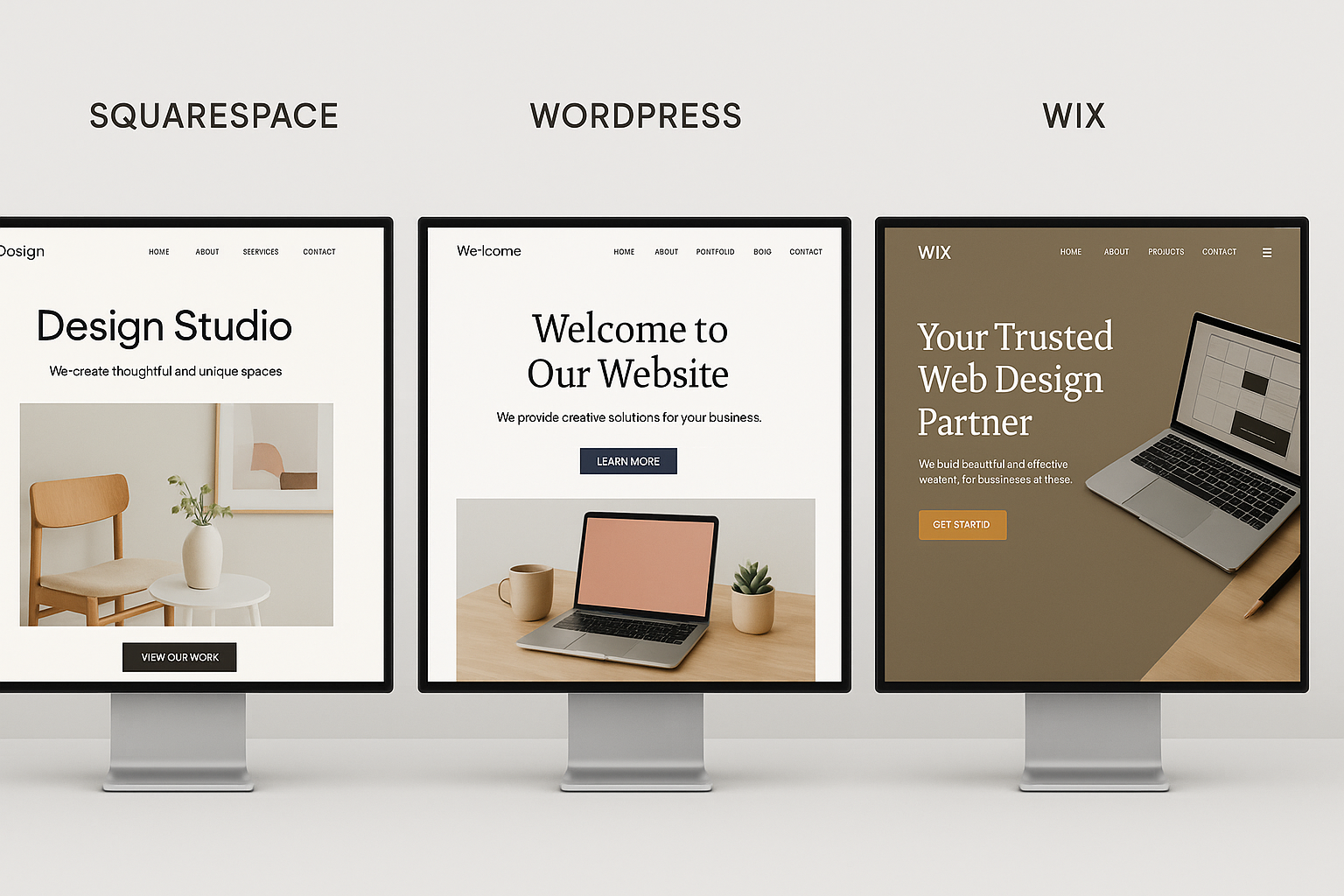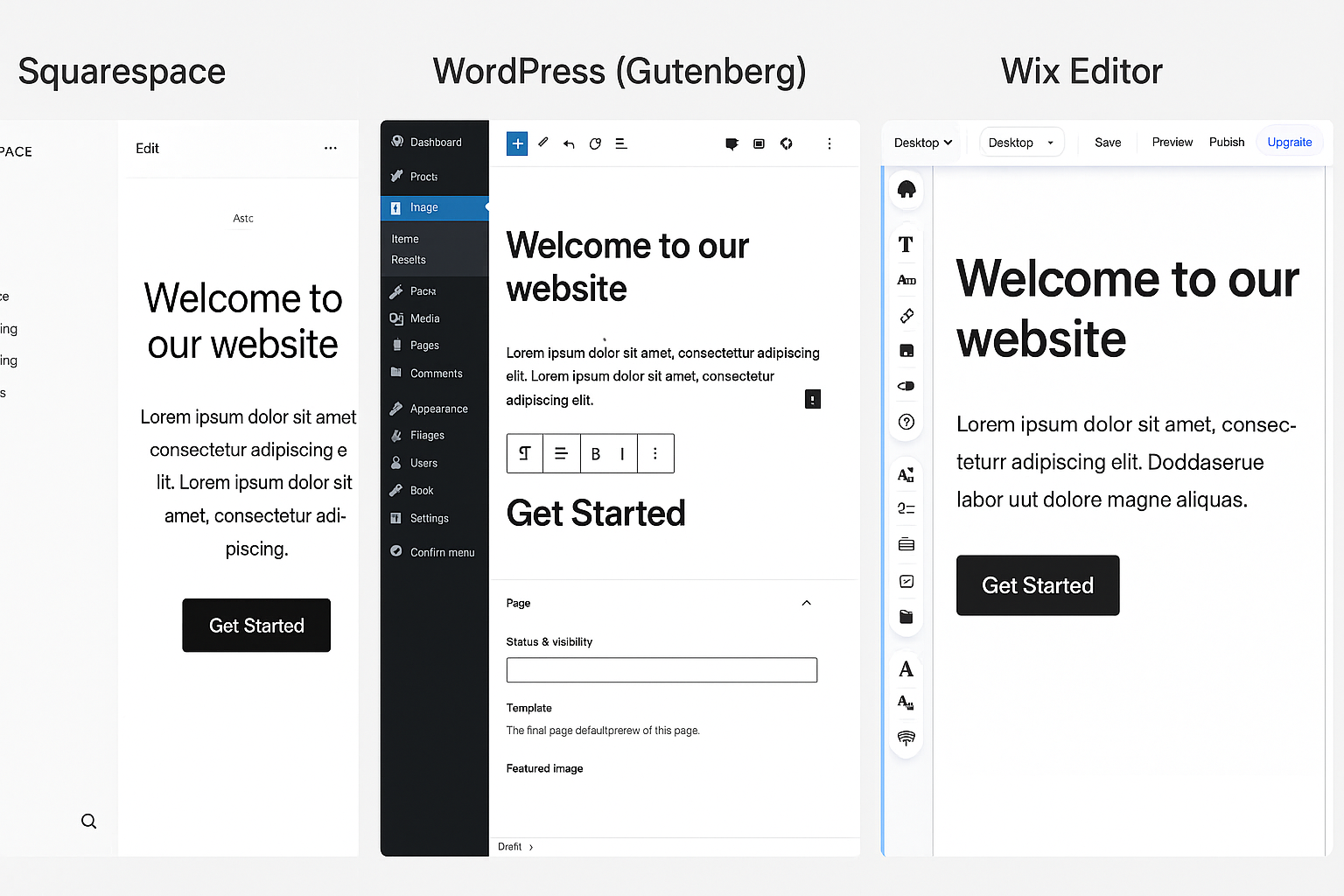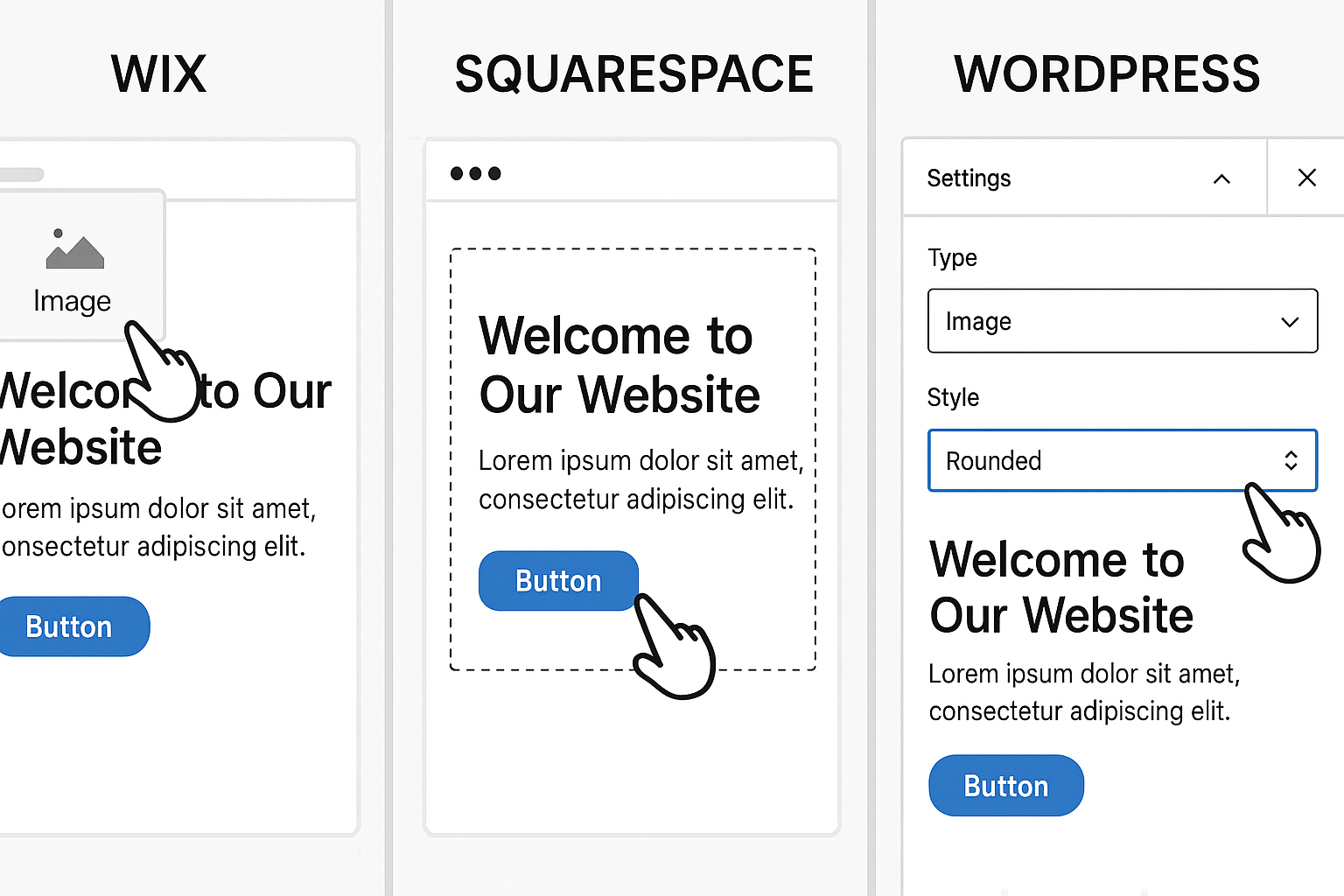Everyone knows Squarespace, WordPress, and Wix are the giants of website creation in 2025.
But how do they truly compare for real-world projects?
In this cheatsheet, you'll discover the definitive breakdown of Squarespace vs WordPress vs Wix—feature by feature, dollar by dollar, SEO trick by SEO trick.
Some are game-changers for beginners.
Some are powerhouses for eCommerce and bloggers.
Some are driven by cutting-edge AI; some by massive plugin ecosystems.
Some will save you hidden costs you never knew existed.
Some could make or break your online brand in 2025.
Let's dive right in.
Squarespace vs WordPress vs Wix: The Ultimate 2025 Guide
- Introduction
- Platform Overview
- Design & Customization
- Ease of Use
- Features & Functionality
- Performance & Reliability
- Cost & Value
- Support & Community
- Use Cases & Recommendations
- Conclusion
Introduction
Why This Guide Exists
Choosing the right website builder isn’t just about flashy templates or the lowest price. It’s about matching your goals—whether that’s blogging, eCommerce, portfolio-building, or scaling a business—with a platform that’s fast, flexible, and future-proof.
This guide provides the ultimate, up-to-date comparison of Squarespace vs WordPress vs Wix, using hands-on research and real-world data from 2025. You’ll see their strengths, weaknesses, and hidden differences—so you can decide with confidence.
What Matters Most
Before you choose, ask:
- Do you value design flexibility or simplicity?
- Is SEO performance or eCommerce power your top priority?
- Are you budget-conscious, or willing to invest for advanced features?
- Do you need phone support, or do you prefer DIY troubleshooting?
- Will you want to scale, blog, sell, or customize deeply in the future?
Your answers will shape which platform is your best fit—and why.
Platform Overview
Squarespace: The Designer’s Dream
Squarespace is a fully hosted, all-in-one website builder known for its stunning, mobile-optimized templates and streamlined editing experience. No hosting headaches, no plugin patching, just beautiful sites with robust built-in features. It’s the go-to for creatives, small businesses, and anyone who wants a polished site fast. Updates and security? All handled by Squarespace.
WordPress: The Customization King
WordPress powers over 40% of the web. It comes in two flavors: WordPress.com (hosted, easier, some limitations) and WordPress.org (self-hosted, ultimate flexibility, but more technical). Thanks to its open-source nature, you can add thousands of plugins, themes, and integrations. It’s favored by bloggers, large eCommerce stores, and anyone who wants full control—but it does demand more setup and maintenance.
Source
Wix: The User-Friendly Innovator
Wix offers a true drag-and-drop experience, a huge template library, and a thriving app marketplace. Its secret weapon? AI-powered site creation and flexible business tools. Wix is perfect for beginners and creatives who want pixel-perfect control, solid eCommerce, and a lightning-fast path from idea to launch.
Source

Design & Customization
Themes & Templates
- Squarespace: 180+ curated templates, each obsessively crafted for modern design, mobile responsiveness, and high-impact visuals. They’re ideal for portfolios, creative agencies, and brands that want to stand out. Every template is responsive and easy to swap—no code needed.
- WordPress: 12,000+ themes (free and premium), plus custom themes from external providers. WordPress wins on sheer volume and variety. From minimalist to magazine-style, you’ll find a theme for every niche. But quality and mobile-responsiveness vary, so choose carefully.
Source - Wix: Over 2,000 templates, covering every industry, style, and trend. Wix gives you the most visual freedom—drag elements anywhere. But a word of caution: once you choose a template, you’re locked in. Switching templates after launch means rebuilding your site, so pick wisely.
Source
Some are works of art. Some are ultra-functional. Some are built for speed. Some are perfect for eCommerce. The right template sets the tone for your whole site.
Customization Flexibility
- Squarespace: Drag-and-drop content blocks, with style editors for fonts, colors, and layouts. For advanced tweaks, you can use custom CSS or code injections (on higher tiers). But deep changes require some technical know-how.
- WordPress: Unlimited customization—edit theme files, install page builders like Elementor, add custom CSS, use the Gutenberg block editor, or even code your own templates. No restrictions, but also no safety net.
- Wix: The most intuitive drag-and-drop builder. Place elements anywhere, tweak layouts pixel by pixel, and use the new Wix Studio for advanced design control. HTML/CSS access is limited, but flexibility is high for most users.
Some platforms give you total control. Some give you guardrails. Some let you go wild with AI-driven design. Your comfort with code (or lack thereof) will decide which you love.

Ease of Use
User Interface & Onboarding
- Wix: The gold standard for beginners. Its editor is intuitive, visual, and forgiving. Guided setup, instant previews, and in-editor tooltips mean you’re never lost. You can even build a site with AI in under 10 minutes.
- Squarespace: Blends design power with clarity. The Fluid Engine editor lets you drag content within a controlled grid, balancing creativity with structure. Onboarding is smooth, and the backend is clean.
- WordPress: Steeper learning curve—especially for self-hosted users. You’ll need to manage hosting, themes, and plugins separately. The Gutenberg block editor is improving, but toggling between backend and live views can slow you down.
Source
Learning Curve
Squarespace and Wix let you launch a simple site in an hour. WordPress, especially for advanced setups, can take several hours (or days) to master. But once you’re over the hump, WordPress becomes a content machine—especially for bloggers and pros.
Some users want to publish fast. Some want to tinker endlessly. Some just need a beautiful site, now. Know your style before you choose.

Features & Functionality
Ecommerce Capabilities
- Squarespace: Built-in commerce tools with unlimited products, inventory management, and mobile checkout. Plans scale from basic stores to advanced features like abandoned cart recovery, subscriptions, and advanced shipping. Payment options include Squarespace Payments, Stripe, PayPal, and more. Transaction fees drop to 0% on higher plans.
Source - WordPress: Add eCommerce via WooCommerce (free, but paid add-ons add up fast). Supports unlimited products, global shipping, coupons, and deep customization. Best for large catalogs, multichannel sales, or niche requirements. But setup and maintenance are more complex.
- Wix: Native Wix Stores lets you sell up to 50,000 products, digital goods, or services. Features include abandoned cart recovery, POS (for US/Canada), multichannel sales (Amazon, eBay, Facebook), and dropshipping. Accept 100+ payment methods globally.
If you want to scale, automate, and track every sale—WordPress is king. If you want easy, beautiful storefronts—Squarespace or Wix shine. Want omnichannel selling and built-in AI tools? Wix leads.
Blogging & Content Management
- WordPress: The original blogging platform. Advanced tools for categories, tags, scheduling, revisions, and SEO plugins like Yoast or All-in-One SEO. Best for serious publishers.
- Squarespace: Strong, visually-driven blog module. Supports scheduled posts, social sharing, and easy content editing. No autosave or revision history, so be careful not to lose work.
- Wix: Blog app with AI-powered content suggestions, autosave, member profiles, and content subscriptions. Great for community-building and newsletters.
Source
Some are built for storytelling. Some for scale. Some for monetization. WordPress is best for advanced editorial control, but Wix and Squarespace are plenty for most creators.
SEO Tools
- WordPress: Unmatched plugin ecosystem—Yoast SEO, Rank Math, All-in-One SEO—offering meta tags, sitemaps, schema, and more. Full control, but some plugins can slow down your backend if not optimized.
Source - Squarespace: Built-in SEO settings: edit titles, descriptions, alt tags, and URLs. Mobile-optimized, automatic sitemaps, Google Search Console integration. Lacks plugin flexibility, but covers essentials.
- Wix: Integrated SEO Wiz and dashboard, AI meta tag generator, SEMrush integration, AI Visibility Overview (tracks mentions across AI platforms), and customizable URL/heading tags. Slightly less flexible than WordPress, but easier for beginners.
Source
Some let you go deep with technical SEO. Some provide guided, beginner-friendly optimization. Some use AI to automate the basics. For maximum ranking power, WordPress still wins—but Wix is closing the gap fast.
Integrations & Apps
- WordPress: 50,000+ plugins: memberships, analytics, marketing, image optimization, and more. If you can dream it, there’s a plugin for it.
- Wix: 1,000+ apps in the App Market, plus a growing suite of AI-driven tools for images, content, and marketing. Great for adding features fast.
- Squarespace: 45+ official extensions, with robust built-in integrations for email, social, scheduling, and more. Smaller ecosystem, but highly curated.
Some platforms overwhelm you with options. Some keep it tight for simplicity. Some give you AI, some give you code-level freedom. Know how much you want to add (and manage).
Performance & Reliability
Loading Speed
- Squarespace: Optimized cloud hosting, global CDN, automatic image compression. Consistently fast for visitors worldwide.
- WordPress: Performance depends on your host, theme, and plugin setup. With good hosting and caching, WordPress can be lightning-fast—or painfully slow if neglected.
- Wix: Built-in CDN and performance optimization. Free sites may be slower due to shared resources, but paid plans are robust.
Uptime, Security & Backups
- Squarespace: 99.9% uptime, automatic SSL, and security patches. Fully managed; backups are handled for you.
- WordPress: Uptime and security depend on your host and your plugin choices. You must manage updates, backups, and malware protection. More responsibility, but also more control.
- Wix: 99.99% uptime, built-in SSL, and robust DDoS protection. Automatic backups and restores available.
Source
Some platforms are set-and-forget. Some need regular checkups. Some put security first, others put it in your hands. Know your risk tolerance.
Cost & Value
Pricing Plans (2025)
- Squarespace:
Basic: $16/mo
Core: $23/mo
Plus: $39/mo
Advanced: $99/mo
All plans include free domain for one year, SSL, unlimited bandwidth, and 24/7 support. Commerce plans remove transaction fees and unlock advanced features.
Source - WordPress: The software is free, but you’ll pay $3–$30+/mo for hosting, plus costs for premium themes ($30–$100+), plugins ($0–$300/yr), and security. ECommerce via WooCommerce is free, but add-ons can add up.
- Wix:
Free: $0 (Wix ads, limited features)
Light: $17/mo
Core: $29/mo
Business: $36/mo
Business Elite: $159/mo
Free domain for one year, storage increases with each plan, and higher plans unlock more eCommerce and marketing features.
Source
Hidden Costs & Value
- Squarespace: Transaction fees on lower tiers, paid add-ons for scheduling and memberships, and higher processing fees on basic plans. No surprise hosting bills.
- WordPress: Premium plugins, themes, security, and backups can add up. Budget for annual renewals and occasional developer help.
- Wix: Free plan includes Wix branding and ads. Essential features (like bookings, advanced forms) may require paid apps. Upgraded plans remove ads and unlock more features.
Some platforms look cheaper upfront. Some are all-inclusive. Some will nickel-and-dime for advanced features. Always factor in your time, skills, and future needs.
ROI Considerations
Squarespace and Wix offer predictable monthly costs, making them ideal for users who want to minimize surprises. WordPress offers the potential for lower costs at scale, but only if you’re willing to invest time and manage updates, security, and growth yourself. ROI is about more than price—it’s about how fast you can launch, scale, and convert visitors into loyal customers.
Support & Community
Customer Support
- Squarespace: 24/7 email support, live chat (Mon–Fri), and a comprehensive help center. No phone support, but responses are fast and helpful.
- WordPress: Community forums, extensive documentation, and paid agency/developer support. Premium hosting plans offer live chat/email support, but only 24/7 on higher tiers.
- Wix: 24/7 phone support (in English), live chat, ticketing, help center, and video tutorials. Best for users who want hands-on help in multiple languages.
Source
Community & Documentation
- WordPress: The largest global user and developer community. Thousands of tutorials, forums, meetups, and YouTube channels.
- Squarespace & Wix: Both maintain growing user forums, official help centers, and dedicated learning resources, but their communities are smaller (and less technical) than WordPress.
Some users want to troubleshoot themselves. Some want instant answers. Some need a developer on call. Choose the support style that fits your skills and schedule.
Use Cases & Recommendations
Best for Bloggers
WordPress is the hands-down choice for serious bloggers and publishers. With robust editorial tools, revision history, advanced SEO plugins, and endless customization, it’s the undisputed king of content. If you want to monetize, build memberships, or manage large archives, go WordPress.
Source
Best for Small Businesses
Squarespace is perfect for small businesses, creatives, and service providers who want a polished, professional online presence with minimal fuss. All-in-one hosting, beautiful design, and built-in booking, commerce, and email tools make it a strong choice for anyone who values reliability over technical depth.
Best for Portfolios & Creatives
Wix stands out for its design freedom, AI-powered tools, and flexible layout options. Visual artists, photographers, designers, and anyone who wants pixel-perfect control will find Wix the most liberating. Its free plan and fast setup are ideal for testing ideas or building multiple sites.
Source
Best for eCommerce
If you want to scale a large online store, integrate with multiple sales channels, or build a truly custom shopping experience, WordPress (with WooCommerce) is your best bet. For easy setup, gorgeous storefronts, and built-in features, Squarespace and Wix shine—Wix especially for omnichannel sales and POS.
Conclusion
Final Verdict: Which Should You Choose?
There’s no one-size-fits-all answer in the Squarespace vs WordPress vs Wix debate. Each platform excels in different areas, and the best choice depends entirely on your needs, skills, and ambitions.
- Choose Squarespace if you want stunning design, simple setup, and all-in-one reliability.
- Choose WordPress if you need total customization, advanced blogging, or plan to scale and optimize for SEO.
- Choose Wix if you crave visual freedom, AI-powered tools, and the easiest path from idea to launch.
How to Decide with Confidence
Create a shortlist of your top priorities: design freedom, ease of use, eCommerce, SEO, cost, or support. Match those priorities against each platform’s strengths. Spend time with free trials and demos before committing. And remember, your needs may evolve—choose a platform that can grow with you.
Armed with the insights from this guide, you’re ready to build a website that’s not just beautiful, but built to win in 2025.
Frequently Asked Questions
Which platform is best for SEO in 2025?
WordPress still leads for advanced SEO, thanks to powerful plugins and granular control. Wix has closed the gap with AI-driven SEO tools, but WordPress remains the pro’s choice. Squarespace covers SEO basics well, but is less customizable.
Is Wix really free?
Wix offers a free plan, but it comes with Wix branding and limited features. To remove ads and unlock advanced tools, you’ll need a paid plan.
Can I switch platforms later?
Migration is possible but can be complex—especially from Wix or Squarespace to WordPress. Plan carefully and consult platform documentation or a migration expert if needed.
Do I need to know how to code?
No coding is required for Wix or Squarespace. WordPress offers more freedom for coders, but many users build entire sites with zero code using themes and plugins.
Is my data secure?
All three platforms take security seriously, offering SSL, backups, and DDoS protection. With WordPress, you’re responsible for updates and backups unless you use a managed host.
What if I need support?
Wix offers 24/7 phone and chat support (in multiple languages). Squarespace provides 24/7 email and weekday live chat. WordPress relies on community support, but managed hosts offer premium help on higher plans.